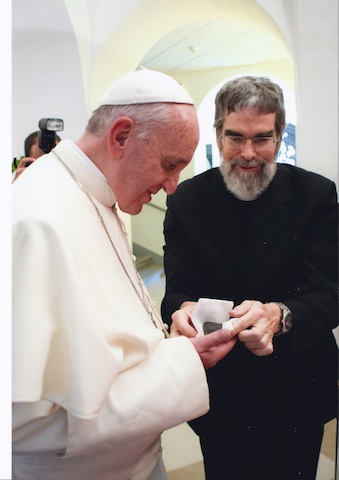Pope Francis, the first Jesuit to ascend to the papacy, has left an indelible mark on the Catholic Church and the world at large. His leadership style, deeply rooted in Jesuit traditions, reflects a commitment to humility, service, and social justice. As we delve into his pontificate, it becomes evident how his Jesuit background has shaped his approach to governance and spiritual guidance.
The Jesuits, known for their rigorous education and emphasis on intellectual rigor, have long been a significant force within the Catholic Church. Pope Francis's identity as a Jesuit brings with it a unique set of values and principles that guide his decisions and interactions. His tenure as pope is a testament to the transformative potential of these ideals when applied to global leadership.
Understanding the First Jesuit Pope: A Decade of Influence
Pope Francis's election marked a historic moment for the Catholic Church, as he became the first Jesuit to lead the institution. Since Jorge Mario Bergoglio stepped onto the balcony of St. Peter’s Basilica in 2013, his words and actions have consistently drawn from the rich tradition of the Society of Jesus. This order, founded by Saint Ignatius of Loyola, emphasizes deep spirituality and a commitment to serving others, particularly those on the margins of society.
As a researcher of Catholicism, one can observe a recurring theme in Pope Francis's writings and speeches. He often speaks of the Church as a field hospital, emphasizing the need for practical, compassionate solutions rather than rigid adherence to dogma. This metaphor underscores his belief in addressing the immediate needs of humanity with empathy and understanding.
This perspective has significantly influenced his approach to various global issues, including poverty, climate change, and interfaith dialogue. By prioritizing action over rhetoric, Pope Francis continues to challenge the status quo and inspire millions around the world.
Exploring the Uniqueness of a Jesuit Pontiff
The idea of a Jesuit pope was once considered improbable due to the order's historical influence and its sometimes contentious relationship with the Vatican. However, Pope Francis's election shattered this perception, revealing the potential for Jesuit values to harmonize with papal responsibilities. Matt Spotts highlights this paradox, noting the unexpected nature of such an appointment.
Despite initial skepticism, Pope Francis's leadership has demonstrated the compatibility of Jesuit principles with the demands of the papacy. His focus on simplicity, accessibility, and outreach aligns seamlessly with the Jesuit mission of fostering a closer connection between faith and everyday life. Through his public appearances and pastoral visits, he embodies the essence of being a man for others.
This alignment has resonated with both believers and non-believers alike, reinforcing the universal appeal of his message. By embracing his Jesuit identity, Pope Francis has redefined what it means to be a modern-day leader within the Catholic Church.
A Legacy Rooted in Jesuit Values
Pope Francis's impact extends beyond the confines of the Vatican, reaching into communities worldwide. His influence is particularly evident in institutions like Fordham University, which reflect on his contributions as a source of inspiration and guidance. The university acknowledges how his dedication to education, justice, and care for creation mirrors the core tenets of Jesuit philosophy.
Throughout his pontificate, Pope Francis has consistently emphasized three key areas where his Jesuit roots shine through: advocacy for marginalized groups, promotion of ecological awareness, and encouragement of dialogue among diverse cultures and religions. These priorities underscore his vision of a more inclusive and compassionate world.
In reflecting on his legacy, it is clear that Pope Francis's journey as a Jesuit pope has not only transformed the Church but also inspired countless individuals to embrace similar values. His example serves as a powerful reminder of the positive change that can arise when personal convictions are aligned with institutional leadership.
Reflecting on the Historic Nature of Pope Francis's Leadership
While the Jesuits have historically held significant influence within the Church, their selection of a member for the papacy was unprecedented until Pope Francis's election. This development challenges preconceived notions about the role of religious orders in shaping ecclesiastical leadership. It also highlights the evolving dynamics within the Catholic Church as it adapts to contemporary challenges.
Ignatius of Loyola might not have envisioned a Jesuit pope during his lifetime, yet Pope Francis exemplifies the enduring relevance of Jesuit teachings in today's context. His ability to balance tradition with innovation has positioned him as a pivotal figure in the Church's ongoing evolution.
As the global community reflects on his contributions, it becomes apparent that Pope Francis's pontificate represents a turning point in the history of the Catholic Church. His commitment to embodying Jesuit ideals while leading the largest Christian denomination demonstrates the profound impact one individual can have on an institution's trajectory.

